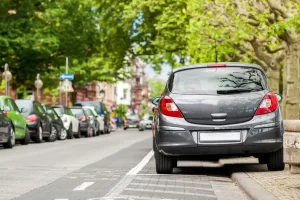Historic Texas Heat Is Breaking Cars In Weird Ways

Texas has again been hit by historic heat waves this summer. Austin is currently undergoing its second-longest stretch of 100-degree days ever recorded, while major cities such as El Paso and Forth Worth are also suffering through extended bouts of triple-digit heat. Mechanics in Texas are now finding unusual ways that the hot weather has affected cars, including broken wipers scratching windshields, and mushy brakes, as KXAN reports.
Why Barbie Poking Fun At The GMC Hummer EV Is One Of The Best Parts Of The Film
Bosch technicians say shops in Texas are coming across the usual issues they’ve come to expect as the heat index rises. These range from dead car batteries — which tend to fare badly in extreme heat — to flat tires that result from pressure loss due to the weather. Lately, these issues have been accompanied by unforeseen problems as heat breaks down certain other compounds like the rubber in windshield wiper blades, which are subject to damage from highly-reflective surfaces, as the Bosch training manager, Doc Watson, explains:
“People don’t stop to think about wiper blades — they don’t need them until it rains, right?” Watson said. “You’re driving around in 112° temperature, you’ve got heat reflecting off the glass, and that causes the rubber components of a wiper blade to break down.”
Both heat and humidity can add extra wear and tear to the rubber components of the blades, which have a typical lifespan between 12-18 months. But it isn’t just the rubber suffering from the relentless heat, but the plastic itself.
“With these extreme temperatures that you guys are seeing, it’s the plastic breaking down off the wiper blade itself, and people not realizing that that’s happened until it’s too late,” he said. “The wiper blade breaks and then you’ve got this metal arm scratching the glass.”
These scratchy metal arms can leave marks on glass surfaces that are stubborn or downright impossible to clear. Because of this, Watson recommends adding wiper blades to the checklist of things to keep an eye on during the summer. The cost of replacing wiper blades is nothing compared to that of an entire front windshield, especially nowadays with windscreens costing more than ever as they are now part of advanced driver assistance systems.
Watson adds that the historic heat is negatively affecting car brakes, as well. Brake fluid within the master cylinder sitting under the hood can trap moisture, and the dangerously high heat in Texas may cause the moisture to expand. This results in a loss of brake feel, or brake fade, per KXAN:
In Texas, Arizona and California, technicians are reporting an emergence of “brake fade” cases in cars. While extreme outdoor temperatures can linger 100° and above, temperatures under the hood of vehicles during the summer can reach up to 230°.
Brake fluids inside the cylinder under the hood of the car can absorb moisture, with the heat under the hood causing that moisture to expand within the fluid. When that happens, stepping on the brake pedal can feel “mushy,” with the vehicle owner needing to take the car in for maintenance.
Mushy brake pedals as a result of high heat may be less unusual for those who understand that brakes are subject to the rigors of performance driving, but it’s unusual for people who aren’t used to their daily drivers suffering from reduced braking performance from the ambient temperature alone. Watson concludes by saying that drivers in Texas should make it a habit to keep an eye on their batteries, tires, coolant and engine oil levels, and, now, wiper blades and brakes.
Photo: Oliver Bunic/Bloomberg (Getty Images)


